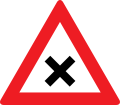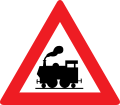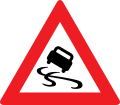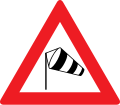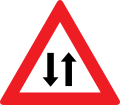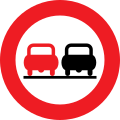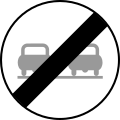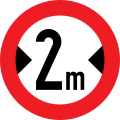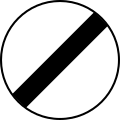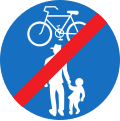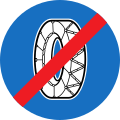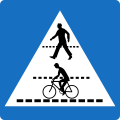Road signs in Austria
This article needs to be updated. (March 2023) |

Road signs in Austria are regulated in Straßenverkehrsordnung (StVO).[1]
Road signs are generally placed on the right side next to the road or above the road. Sometimes signs are also placed on both sides, in some exceptional cases signs are only place on the left or on one side (particularly town signs).
Austrian warning and prohibitory signs have a white background framed by red edges like most of the European road signs. However Austria has a different No through road (dead end) - sign as most of the European countries. The sign seems to be a white inverted T and has no red stripe.
Austrian road signs depict people with realistic (as opposed to stylized) silhouettes.
The Vienna Convention on Road Signs and Signals, the country's original signatory, takes its name from the country's capital, Vienna. Austria signed the Vienna Convention on Road Signs and Signals on November 8, 1968 and ratified it on August 11, 1981.[2]
Signs with text are set in the Tern typeface since 2013.[3]
Warning signs
[edit]-
1: Uneven road
-
2a: Dangerous curve to right
-
2b: Dangerous curve to left
-
2c: Dangerous curves, first to right
-
2d: Dangerous curves, first to left
-
3: Crossroad with priority to the right
-
3a: Roundabout
-
4: Crossroad with minor priority road
-
6a: Level crossing with barriers
-
6b: Level crossing without barriers
-
6c: Level crossing mark (left) - Distance to level crossing approx. 80m
-
6c: Level crossing mark (right) - Distance to level crossing approx. 80m
-
6c: Level crossing mark (left) - Distance to level crossing approx. 160m
-
6c: Level crossing mark (right) - Distance to level crossing approx. 160m
-
6c: Level crossing mark (left) - Distance to level crossing approx. 240m
-
6c: Level crossing mark (right) - Distance to level crossing approx. 240m
-
Level crossing without barrier in approx. 240m
-
Level crossing with barrier in approx. 240m
-
Level crossing without barrier in approx. 240m
-
6d: Andreaskreuz: Indicates a single-track level crossing
-
6d: Andreaskreuz: Indicates a multitrack level crossing
-
6d: Single-track level crossing (Andreaskreuz)
-
6d: Multitrack level crossing (Andreaskreuz)
-
6d: Andreaskreuz (sideward)
-
6d: Andreaskreuz (sideward)
-
7: Steep hill downwards
-
7a: Steep hill upwards
-
8a: Road narrows on both sides
-
8b: Road narrows from left side
-
8c: Road narrows from right side
-
9: Road works
-
10: Slippery road
-
10a: Crosswind
-
10b: Falling rocks
-
10c: Low-flying aircraft
-
11: Pedestrian crossing
-
11a: Cyclist crossing
-
12: Children
-
13a: Animals (cow)
-
13b: Animals (deer)
-
14: Two-way traffic
-
14a: Motorist driving against the traffic on motorways
-
15: Traffic signals
-
16: Other dangers
Prohibitory signs
[edit]-
1: Closed to all vehicles in both directions
-
2: No entry
-
3a: No left turn
-
3b: No right turn
-
3c: No U-turns
-
4a: No overtaking
-
4b: End of overtaking restriction
-
4c: No overtaking by lorries
-
4d: End of overtaking by lorries restriction
-
5: Duty of wait by oncoming traffic (give priority to vehicles from the opposite direction)
-
6a: No power-driven vehicles except single-tracked motorcycles
-
6b: No single-tracked motorcycles
-
6c: No power-driven vehicles
-
6d: No power-driven vehicles drawing a trailer
-
7a: No lorries
-
7a No lorries having a weight exceeding ... tonnes
-
7a No lorries exceeding ... meters
-
7b: No lorries drawing a trailer
-
7c: No animal-drawn vehicles
-
7e: No vehicles carrying dangerous goods
-
7f: No omnibuses
-
8a: No cycles or mopeds
-
8b: No mopeds
-
8c: No cycles
-
9a: No vehicles having an overall width exceeding ... meters
-
9b: No vehicles having an overall height exceeding ... meters
-
9c: No vehicles exceeding ... tonnes laden weight
-
9d: No vehicles having a weight exceeding ... tonnes on one axle
-
10a: Speed limit (allowed maximum speed)
-
10b: End of speed limit
-
11: End of overtaking-restriction & speed limit
-
11a: Zone limitation
-
11b: End of zone limitation
-
12: Stop for customs
-
13a: No parking
-
13b: No standing or parking
-
13c/a: Alternative parking - No parking on uneven days
-
13c/b: Alternative parking - No parking on even days
-
13d: Beginning of a short-term parking zone
-
13e: End of a short-term parking zone
-
14: Prohibition of horn sounding
-
14a: Riding prohibited
-
14b: Pedestrians prohibited
Mandatory signs
[edit]-
15: Prescribed direction: Left only
-
15: Prescribed direction: Right only
-
15: Prescribed direction: Straight ahead only
-
15: Prescribed direction: Turn left
-
15: Prescribed direction: Turn right
-
15: Prescribed direction: Turn left or continue straight ahead
-
15: Prescribed direction: Turn right or continue straight ahead
-
15: Prescribed direction: Turn left or right
-
15: Prescribed direction: Follow lane on the left side
-
15: Prescribed direction: Follow lane on the right side
-
15a: Prescribed direction for transport with dangerous goods
-
16: Track for cyclists & roller-skaters
-
16a: End of track for cyclists & roller-skaters
-
17: Footpath - Track only for pedestrians
-
17a: Track only for cycles & pedestrians
-
17a-b: Track only for cycles & pedestrians (separated tracks)
-
17a-c: End of Track only for cycles & pedestrians
-
17a- d: End of Track only for cycles & pedestrians (separated tracks)
-
17b: Track only for horse riders
-
17c: End of footpath - Track only for pedestrians
-
18: Pedestrian underpass
-
19: Prescribed minimum speed
-
19a: End of prescribed minimum speed limit
-
21: U-turn is prescribed
-
22: Obligation to put on snow chains
-
22a: End of obligation to put on snow chains
Priority signs
[edit]-
23: Yield
-
24: Stop
-
25a: Crossroad/sideroads road
-
25a: End of Crossroad/sideroads
Informational signs
[edit]-
1a: Parking lot or parking lane
-
1b: Parking lot
-
1c: Breakdown bay
-
2: Hospital
-
2a: Pedestrian crossing
-
2b: Cyclist crossing
-
2c: Pedestrian and cyclist crossing
-
2c: Cyclist and pedestrian crossing
-
3: First aid
-
3a: Church services
-
4: Break-down service
-
5: Telephone
-
6: Gas station
-
6a: Taxi stand
-
7: End of two-way traffic
-
7a: Oncoming traffic must give way
-
8a: Beginning of Motorway
-
8b: End of Motorway
-
8c: Motorroad
-
8d: End of Motorroad
-
9a: Pedestrian zone
-
9b: End of pedestrian zone
-
9c: Residential street
-
9d: End of a residential street
-
9e: Residential mixed traffic area
-
9f: End of residential mixed traffic area
-
9g: Tunnel
-
10: One-way traffic (left)
-
10: One-way traffic (right)
-
10a: On red or yellow traffic light, trams turn into the following direction
-
11: No through road (dead end)
-
12: Street lights that are not turned on for the whole night
-
13a Direction sign
-
13a Direction sign
-
13b: Direction sign
-
13b: Direction sign
-
13b: Direction sign
-
13c: Direction sign to other transportation infrastructure
-
13d: Direction sign to local destination or destination area.
-
14a: Direction sign for an upcoming junction to a Motorway or Motorroad
-
14b: Direction sign to Motorway or Motorroad (right)
-
14b: Direction sign to Motorway or Motorroad (diagonal right)
-
15a-a: Direction sign for an upcoming Motorway or Motorroad exit
-
15a-b: Direction sign for an upcoming Motorway or Motorroad exit
-
15a-c: Direction sign for an upcoming Motorway or Motorroad exit
-
15a-d: Direction sign for an upcoming Motorway or Motorroad exit
-
15b-a: Exit sign - Motorway or Motorroad
-
15b-b portrait: Exit sign - Motorway or Motorroad
-
15b-b landscape: Exit sign - Motorway or Motorroad
-
15c: Orientation sign – Motorway or Motorroad
-
16a: Warning of an upcoming diversion
-
16b: Diversion to a town (destination)
-
16b: Diversion
-
16b: Diversion (for lorries)
-
16c-a: Change of lane directions/Oncoming lanes will come to an end in ... m
-
16c-b: Change of lane directions/Oncoming lanes will come to an end in ... m
-
17a: Town sign
-
17b: Town area ends
-
18: International arterial
-
19: Street with the right-of-way
-
21: Street without the right-of-way
-
22: General speed limits in Austria
-
23: Prescribed direction
-
23a: Prescribed direction
-
23a: Prescribed direction
-
23b: Two lanes merge into one in my driving direction
-
23b: Two lanes ahead in my driving direction
-
23c: Lanes merge
-
24: Road reserved for buses
-
25: Lane reserved for city buses
-
26: Road reserved for bicycle
-
27: Bicycle path
-
28a: Pedestrian and bicycle path (shared)
-
28b: Pedestrian and bicycle path (separated)
Additional auxiliary signs
[edit]-
a: Distance
-
b: Length
-
c: STOP sign announcement
-
d: Crossroad is a priority road
-
e: Defined course of a priority road
-
f: In case of snow ice buildup on road
-
g: In case of rainfall
-
h: Except (people using wheelchairs)
-
i: Except (motor tractors, power-driven working vehicles)
-
j: Tow-away zone
-
k: Only for this lane
-
l: Only for lane, on the left side of median
-
m: Except for electrical vehicle during charging
Further signs
[edit]-
School bus sign - schoolchildren transportation (Austria)
Retired signs
[edit]-
16: Other dangers
-
24: Stop
-
10: One-way traffic (left)
-
10: One-way traffic (right)
-
7d: Tank or fuel vehicle prohibited
-
Pay attention to train related acoustical signals
-
School bus sign - schoolchildren transportation (Germany) (also used in Austria)
See also
[edit]References
[edit]- ^ Republic of Austria (12 November 2018). Straßenverkehrsordnung 1960, Fassung vom 12.11.2018. Federal Ministry for Digital and Economic Affairs. pp. § 50. Retrieved 12 November 2018.
- ^ "United Nations Treaty Collection". treaties.un.org. Retrieved 2023-12-10.
- ^ "292. Verordnung der Bundesministerin für Verkehr, Innovation und Technologie, mit der die Verordnung über Straßenverkehrszeichen (Straßenverkehrszeichenverordnung 1998 – StVZVO 1998) geändert wird (1. Novelle zur StVZVO 1998)" (in German). 3 October 2013. Retrieved 15 March 2023.






